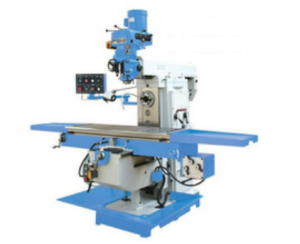Milling machine
Although there are many types of milling machines, the basic structure is roughly the same, including the mechanism that makes the milling cutter produce rotary motion and the workpiece produces linear or rotational motion.
The worktable can move longitudinally, which is called longitudinal worktable. It can also be used to clamp workpieces and fixtures. There are three T-shaped grooves on the worktable for placing T-shaped screws, which can effectively fix workpieces and fixtures. The worktable is located under the longitudinal worktable and above the horizontal slide plate. There are transverse guide rails on the horizontal slide plate, which can make the worktable move laterally, called the horizontal worktable, which can rotate around the turntable below.
The lifting table is installed on the vertical guide rail, and the worktable can be driven to reciprocate up and down through the screw rod. A gear transmission mechanism, a motor and other mechanisms of the mechanical transmission system are installed in the lifting platform. The spindle is the key part of the machine tool, which is used to mount the milling cutter and give the milling cutter rotational movement. The cantilever beam can move horizontally back and forth along the horizontal guide rail to increase the rigidity of the tool bar, so its extension length depends on the length of the tool bar. The bracket has the same function as the cantilever beam, and also increases the rigidity of the tool bar. The outside of the left part of the bed is equipped with a speed change handle to manually adjust the speed of the main shaft. The base is used to support the machine tool, and there is a coolant tank inside.
Confirm that the feed in each direction is normal
Suppose the operator is directly in front of the milling machine, shake the horizontal handle clockwise, and the table moves away from the operator. By shaking the lateral handle counterclockwise, the table moves closer to the operator.
Assuming that the operator is on the right side of the milling machine, shake the longitudinal handle clockwise, and the table moves away from the operator. By shaking the longitudinal handle counterclockwise, the table moves closer to the operator.
Turn the lift handle clockwise to lift the worktable. Shake the lift handle counterclockwise to lower the worktable.
Confirm that each switch is in the initial position
Confirm that the spindle switch should be in the OFF position.
Confirm that DIRECTION CONTROL and JOG SWITCH for automatic feed are both turned off (ie, the middle position)
Make sure the reset button is in the shooting position
Power on the machine
Flip the START switch to the right
Press the power button
Turn right to release the RESET button
Debug automatic feed
Move the DIRECTION CONTROL key to the left
Rotate the SPEED ADJUST key to adjust the feed speed to an appropriate position
Toggle the JOG SWITCH button to the SPEED position, and the workbench will automatically move to the left at the set speed
Toggle the JOG SWITCH key to the 0 position, the table stops moving to the left
Toggle the JOG SWITCH key to the JOG position, and the table moves to the left
Release the hand, the JOG SWITCH key will automatically return to the 0 position, and the worktable will stop moving to the left.
Move the DIRECTION CONTROL button to the right
Toggle the JOG SWITCH button to the SPEED position, and the workbench will automatically move to the right at the set speed
Toggle the JOG SWITCH key to the 0 position, the table stops moving to the right
Turn the DIRECTION CONTROL key to the middle position to complete the adjustment of the automatic feed.



